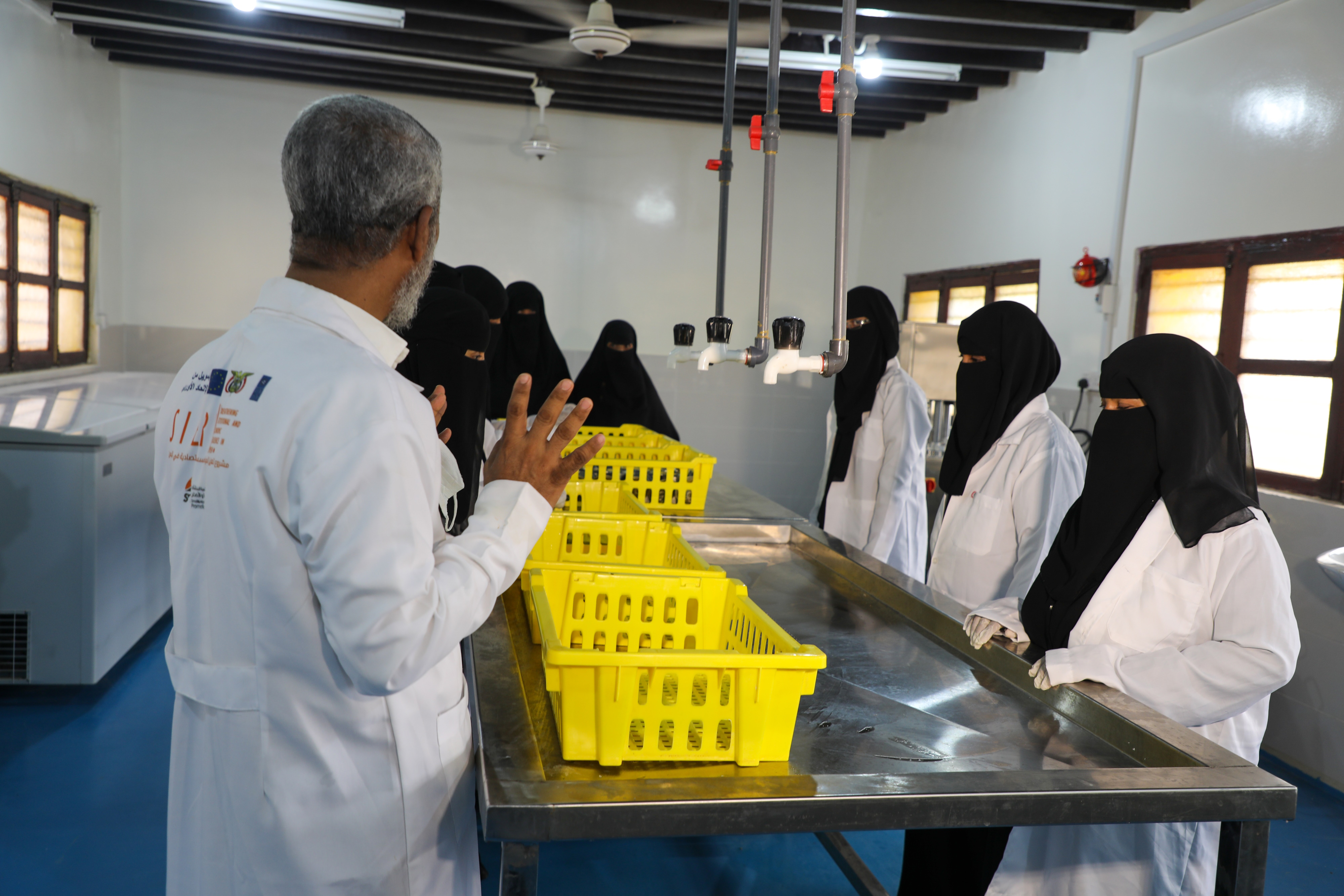Driving Al-Buraiqa’s economic landscape through women entrepreneurship
December 1, 2024

Showcasing products during a training on tuna canning at the micro tuna factory of the Fuqom Women Association.
Over the past decade, public revenue in Yemen has plummeted as a result of the country’s economic crisis, impacting the capacity of state institutions to deliver public services and programmes.
Prior to the onset of the conflict in Yemen, approximately 49 percent of the population was living below the poverty line. Economic hostilities have only beleaguered this situation, with rising food and commodity prices, loss of livelihoods, declining purchasing power, persistent unemployment, and increasing reliance on humanitarian aid further amplifying destitution.
This is Awada. She is a member of the Fuqom Women Association in Al-Buraiqa and one of the 21 women who have participated in tuna canning and business management trainings supported by the Strengthening Institutional and Economic Resilience in Yemen (SIERY) Project funded by the European Union in Al-Buraiqa.

Awada during a tuna canning training at the micro tuna factory of the Fuqom Women Association.
"Our community’s main source of income comes from catching and selling fish. Whatever is left unsold from fisherfolks’ catch, is usually stored in fridges. However, frequent power cuts mean that much of it goes bad, leaving us unable to eat or sell it," remarks Awada.

Fishing boats anchored on the coast of Al-Buraiqa.
The communities of Al-Buraiqa District are considered among the poorest in Aden Governorate, despite the rich resources of their coast. Its remote location from services, including educational institutions, has long hindered the district’s development. The protracted crisis has further upended the district, unequivocally impeding progress.

Awada among other women at a tuna canning training at the Fuqom Women Association.
"Through the SIERY Project, we received training on tuna canning and preservation and production of fish spice blends. We also learned how to manage sales, generate income and revenue, budget, maintain quality standards, and market our products. This has helped us on both personal and professional levels," says Awada.

Alyaa, a training participant at the Fuqom Women Association.
Alyaa, a 23-year-old training participant also form Al-Buraiqa echoes Awada’s sentiment: “Through this training, we learned how to be resourceful with our catch. Very often, fish would spoil either because they weren't sold or because of ineffective preservation practices.”
Alyaa, like many women in the area, had to forgo higher education to support her family. “You can rarely find anyone that can afford university tuition in Al-Buraiqa. On top of that we are so far away from higher educational institutions,” she shares.
Realising the importance of acquiring a technical vocation to improve her livelihood, Alyaa participated in the training. “The skills I gained from the training helped me start my own fish spice business from home,” she adds.

Amina at the backyard of the Fuqom Women Association.
"The women who have attended the training are now able to support their families financially through their businesses and they are more confident. We have noticed a major change in their attitude and civic engagement. Some are now able to finance their family members’ higher education studies," shares Amina, a board member of the association.
Established in 2011, the Fuqom Women Association provides social services for the community of Al-Thuqob in Al-Buraiqa. The association is financed through a table salt factory, a training hall, a sewing atelier, and now the tuna micro factory. It provides women with psychosocial support and children with a safe space to play. During the crisis, the association members started working with humanitarian agencies to provide relief to the community.
“The business management training has also helped us manage the association and chart development plans,” explains Amina.
The establishment of the tuna micro-factory was part of the association’s development plan. With grant support from the SIERY Project, the micro-factory was established and is now in the final stages of obtaining permits to operate and registering as a trademark. The factory is completely managed by women, and 11 women from the district are working in it full time. It has the capacity to produce 500 cans of tuna per day and the association will be engaging shops and markets to sell the products, creating a fully sustainable business.

The Strengthening Institutional and Economic Resilience in Yemen Project’s support to the fish value chain across Yemen extends beyond this training. Similar trainings have been carried out in Hadhramaut also targeting women, a fish value chain study has been conducted, and two fish export centres in Aden and Hadhramaut are underway to support national efforts in expanding to other markets.
This was made possible thanks to the European Union.

 Locations
Locations



